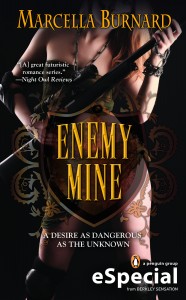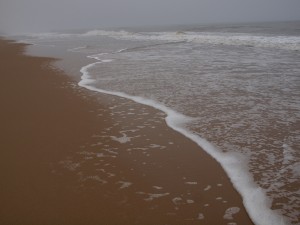 I’m over at Word Whores this Easter Sunday, mixing up my holidays and talking about the pets of my childhood.
I’m over at Word Whores this Easter Sunday, mixing up my holidays and talking about the pets of my childhood.
Deciding on Genre
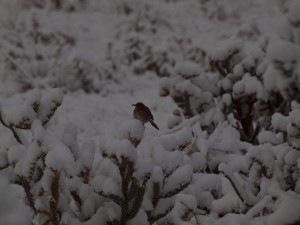 The conversation prompted by yesterday’s post on writing in multiple genres, both on the blog and elsewhere (sorry, some people ping me in other venues, rather than commenting – it’s all good to me), has gotten me thinking about genre.
The conversation prompted by yesterday’s post on writing in multiple genres, both on the blog and elsewhere (sorry, some people ping me in other venues, rather than commenting – it’s all good to me), has gotten me thinking about genre.
First of all, someone pointed out to me that Kris Rusch posted on a very similar theme yesterday, which is well worth reading. Essentially she agrees that it’s good for authors to write in multiple genres because it broadens audience. She also pointed to a workshop conducted by her husband, Dean Wesley Smith, on writing to genre and genre conventions. She kind of complains that only a few writers sign up for this every year, implying that this shows poor business sense.
On top of that, I’m cross-posting this to the Here Be Magic blog, because someone else wasn’t able to, and the theme this month is “Fantasy Romance Favorites.” For those of you not in the swim, fantasy romance is its own sub-genre now.
So I blithely agree to cross-post, then starting racking my brain for fantasy romance books. You’d think this would be easy for me, since Rogue’s Pawn, the novel I have coming out July 16 from Carina, is fantasy romance.
Heh. And yet – not so much.
See, if I’d taken that workshop from Dean Wesley Smith, I would have written the book to the genre I picked. I can see how this would make good business sense. I totally did not do this. I started out with a character. I knew she was a scientist and that she became a sorceress. There were seed images and feelings that I dreamed. The stuff with the bathing chamber deep underground and the Black Dog – all stuff I dreamed.
(I know very few of you have read it yet – soon, soon!)
I did *not* dream the genre. Nor did I decide, “oh! I’ll make this a fantasy romance, which means I need to follow this genre conventions.” No, I wrote the story and there ended up being this waltz of seduction with a manipulative Fae in the story and there were my romantic elements.
Did this method cause me problems? Of course it did! I can tell people it’s kind of like Jacqueline Carey and a bit like Anne Bishop, kind of like Diana Gabaldon and with hints of J.R. Ward. Which, if you have read those writers, probably sounds like a muddle.
Would it have made better business sense to take Smith’s workshop and get good at writing within genre conventions? Probably so.
And yet. I don’t wanna.
This might mean I will never be a hugely best-selling author. Today, I am at peace with that.
Categorizing books by genre help readers find what they want, but that way of defining is only one tool. As readers, we all know it doesn’t always work. How many times have you have to ask the person in the Big Box Bookstore where they shelved a particular author? When I was on my Laurell K Hamilton kick, I had to ask. They’d put her under Mystery. Okay. I’ve read numerous pieces speculating that Fifty Shades of Grey has hit this new audience so big because none of them know it’s a romance novel, much less “erotic romance with BDSM elements.” Young Adult (YA) didn’t even become a genre until recently. What were reading, those of us who were young readers in the 70s and 80s? Hard to say.
This is my problem as a reader, thinking about Fantasy Romance Favorites. Does Jacqueline Carey count? I bet not, because the romantic arc, while important, isn’t the main backbone of the stories. The ISBN has it under “Kings and rulers, succession,” which really amuses me.
What this comes down to for me is that the whole concept of genre is a construct. It’s not real. It’s about branding and marketing and expectations and easy sound bites, but it has nothing to do with the actual story.
And isn’t the story what it’s really all about?
Being Practical about Writing in Multiple Genres
 Don’t worry – the snow is all gone now and we’re back to spring sunshine. I just thought it looked really neat, the way the snowy tree made a cave with treasures beneath.
Don’t worry – the snow is all gone now and we’re back to spring sunshine. I just thought it looked really neat, the way the snowy tree made a cave with treasures beneath.
So, Rachelle Gardner, literary agent, posted on her blog today a whole bunch of really good reasons for debut authors, in particular, to stick one genre. Yeah, we’ve all heard this advice multiple times. Stick to one genre. Build an audience. Develop your brand so readers know what they’ll get when they pick up your books.
It’s undoubtedly good advice. Angela James, who you all know I think is a smart cookie, gives the same counsel. I appreciate that agents and editors take the time to explain these things. It’s helpful for writers to get the business perspective.
But that’s exactly what it is: the business view of things.
Of course that’s how editors and agents see the world of writing. That’s their job. Books are more clear from their side of the desk. They like the genre to be clearly defined, from manuscript to where it will sit on the bookstore shelf. They know about building readership and how that best works. Thus it’s easy and simple for her to give advice such as:
If you’re writing in several genres and you’re not published yet, be aware that the first book you sell and publish will determine the genre you’ll be working in for quite a while. Choose carefully!
To me, this is akin to the advice to pick your top three dream agents and direct all your efforts to winning their representation. Again, I’m sure this seems very clear from the other side of the desk, but for a writer who’s trying to wedge her stories into a difficult market, this is far from an easily defined effort.
For example, let’s talk about me. (My favorite topic!) I started out writing nonfiction – personal essays, creative nonfiction, narrative nonfiction. I did fine. But not well enough to make a living at it. Then I got the Burn to write this fantasy, full of sex and romance and science. All you writers know what I mean by the Burn, right? It’s when that story idea is smoldering away, like money burning a hole in your pocket, dying to be spent. The Burn is what makes the story come to life for me. And when it’s not there, it seems the story just stays this wooden construct, a corpse on the slab.
Unfortunately, my wonderful fantasy was not a clear genre. I couldn’t sell it. (Though I have now – that’s Rogue’s Pawn which comes out July 16!) So I wrote the next book. And in between there, I did what Rachelle says not to do. Rather than focusing on one genre, I wrote a BDSM erotica, Petals and Thorns. I sold that nearly immediately.
See, the thing is, agents and editors make these things sound like they’re under our control. From their perspective, I’m sure it seems that way. Choose carefully! But very often what sells first is dictated by the market, not by what we decide.
Rachelle says: I don’t hear Stephen King bemoaning that no one wants to read an Amish romance from him.
This is actually a really bad example because, as many writers know, Stephen King really wanted to write more literary, contemporary fiction. He has written some of it. And I’ve read interviews where he talks about how, by selling Carrie first, that set his path. He didn’t choose it. He was poor, eking out writing time and trying lots of different stories. That’s the one the market fastened on.
Rachelle says we need to focus on our main goal: to sell books. Now, while all authors love to sell books, I feel it necessary that it’s really the agent’s main goal to sell books. As it should be. Selling books is a wonderful thing because it means people read what we write and it brings in the monies, which enables us to write more books. Because, really and truly, for most writers, our main goal is to write. If my main goal was to sell books, I’d be an agent or a publisher or a bookseller.
I’m not those things because I’m a writer. Writing stories is the most important thing to me.
So, while I think it’s good for us to consider the marketing perspective, in some ways I think this kind of advice is fundamentally unhelpful. It’s how the agents and editors would like us to think and we can try to harmonize with that. But I also think that writers are dancing to a different melody. We’re following the Burn.
There’s rarely anything practical about that.
The Product of Sex Coaching
Does anyone remember the Mickey Mouse Club on TV? They’d run around singing “Today is Tuesday – we’re gonna have a Special Guest!” Like it was totally the Best Thing Ever.
Today *I* have a Special Guest! And she may or may not have referred to me as her sex coach, which tickles me so. Please welcome Marcella Burnard, celebrating the release of ENEMY MINE. I’ll buy a copy for a lucky commenter!
It was a priority-two alert for beautiful Commander Cashel Khaleize: a contract put out on the life of Xiao Zhong. Professionally, Xiao was the Captain she reported to. Personally, he was man she desired. But as female Guild Assassin Mekise Tollenga closes in, Xiao wonders if even Cashel can be trusted with his safety. And with a tenuous bond between them, Cashel wonders how far she’s willing to go to earn that trust.
Enemy Mine began as a dare issued in the midst of an instant messenger conversation. I think I made the comment that I wished I could write something sexy. Jeffe instantly said, “You totally could.” I laughed and said, “Doubt it.” She said, “Bet you could.” After a bit of possibly childish back and forth, I relented and said, “Fine. I’ll try. But it’ll suck.”
“No, it won’t,” Jeffe declared. “I’ll be your sex coach.”
Okay. It didn’t really happen like that. But Jeffe did offer to act as a resource – in case I had questions about the arc of an erotica (as opposed to the arc of my usual scifi romance novels). I did have questions. Lots and lots of them. Ultimately, I’m not sure who won what or where. I set out to write an erotica, but this story isn’t that quite. Hot? Yes. With a few minor BDSM themes thrown for good measure, because the romance was much more fun that way. Throughout the process, Jeffe very patiently answered questions, and explained psychology. She’s just that kind of friend.
I’m sure I owe Jeffe at least one drink at the Romantic Times Book Lovers Convention being held in Chicago. I mean, she offered expert advice – no, I will not specify what kind – and even kindly critiqued the various drafts of Enemy Mine. If you’re going to RT, look for us in the bar! Or check in at one of the reader parties or the book signing. I have silly goodies to offer. You see, to celebrate the release of the novella, my twelve-going-on-thirteen year old niece helped me assemble swag for RT. We stapled glow in the dark, bug-shaped rubber bands to cards with the novella cover – just silly, fun promotional freebies. (Yes. I’m *that* aunt – the one corrupting the preteen.)
She looked at the cover. “What’s it about?” she asked.
I shrugged. “It’s mostly sex.”
“Oh.” All interest went out of her eyes. “Can I have a bug band??
For helping me staple two hundred plus of those things? The kid got a bug band. If you’re in Chicago in mid-April for the convention, come find me, and get your own bug band. If you read Enemy Mine, I’d love to hear your assessment of the story. Scorching sexy? Slightly toasty? Luke warm? Of ice age?
How to Become a Phenomenon
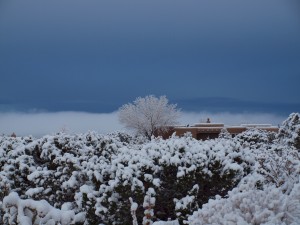 We got snow. A lovely, soaking snow that started in the afternoon and continued through the night. The ground is busily sucking up the much-needed moisture. Don’t worry – the spring flowers are fine. I only wish you could hear the birdsong soundtrack that goes with this photo.
We got snow. A lovely, soaking snow that started in the afternoon and continued through the night. The ground is busily sucking up the much-needed moisture. Don’t worry – the spring flowers are fine. I only wish you could hear the birdsong soundtrack that goes with this photo.
Also, big shout out to Marcella Burnard, friend and critique partner, whose sexy novella Enemy Mine releases today! She’ll be visiting the blog tomorrow, when she plans to blame it all on me, as I understand. Despite that threat, I plan to give away a copy to a carefully chosen commenter.
But that’s not why you’re here, is it? You want to know how to become a phenomenon.
Don’t we all.
I’m hearing this discussion a lot lately, especially with the sudden frenzy over 50 Shades of Grey. My mom sent me this link the other day, to the Fifty Shades Frenzy video. It’s not that long and kind of fun to watch, if only for the sheer enthusiasm of these women, lighting up over the book. My mom then commented, “she stole your idea!”
This is why we love our mothers.
Indeed, author after author on Twitter has been reporting various family members contacting them, asking if they’ve hear of this book. Suddenly what a lot of us have been writing for some time has been catapulted into the public eye – and approval, even. Suddenly people have heard of what we write.
And people are working the angles.
Some writers are tearing out their hair that this particular book is the one to hit, analyzing its many flaws. Others are talking about how their genre is HOT now and how to capitalize on that. Mostly what everyone wants to do is figure out is the magic formula. Why THIS book??
Mostly, we are jealous.
I mean, I am jealous.
I know it’s low of me, an unflattering insight into my less than sterling character. But there it is. I want for my books what this book is getting. The love, the notice. Chocolate-covered heroin, doncha know. The money would be nice, too.
The thing is, though, I think this is an impossible question. A while back I posted about the interview between JK Rowling and Oprah Winfrey, where they discussed what it’s like to become a phenomenon and why it happened to them. They don’t know either. They were right there, creating the thing and they have no idea. If you watch the Fifty Shades Frenzy video to the end, you’ll see an interview with EL James. SHE has no idea either. You’ll see – this is not a woman who’s a sharp marketer or calculated her way to the hearts of the ladies in the video. She simply started writing her spin-off fantasy of Twilight and BOOM!
(It should be pointed out that, despite its apparent sudden advent into public awareness, this is not an overnight boom. I read the book over a year ago.)
So, even as I rummage in my desk drawer for chocolate, because there is no chocolate-covered heroin available, stewing because other people have what I want, I know it’s all the merry-go-round. It’s all lights, tinkling music and fake horses. Up and down, round and round. Until you’re vaguely queasy and wondering why the ride sounded so appealing in the first place.
Figuring out how to be a phenomenon is like figuring out how to win the lottery.
My friend from college who has a masters in statistics was posting some numbers the other day. She said that the odds of winning the Mega Millions lottery were 1:175,711,536. This compared to the odds of dying in a plane crash (1:29,400,000) or being hit by lightning (1:10,000). Looking only at the number of books published in the US in 2009 (the easiest number I could find), the odds of having the stand-0ut book of that year would be 1:288,355. I’m betting that number doesn’t include self-published books either, which is how Fifty Shades started out.
How we’d define phenomena like Fifty Shades, or empires from the Twilight or the Harry Potter books, I have no idea. This is why *I* don’t have a masters in statistics.
Suffice to say, stay inside during thunderstorms and don’t worry so much about flying.
We can write good books while doing both of these things.
Reading Stagnation
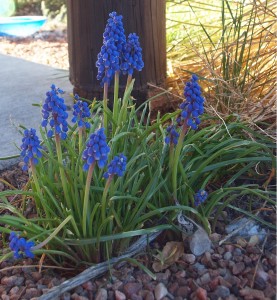 Spring seems to be officially here! Isn’t it lovely to see the flowers again?
Spring seems to be officially here! Isn’t it lovely to see the flowers again?
Over the weekend, I was catching David up on some of the discussions during the week about whether reading “literary” fiction is better for you. I told him about my blog posts on Careless Conclusions in Genre Reading and whether suffering is a human virtue.
Okay, I might have been ranting. This is the public service that David performs for you all. He listens to my ranting so YOU don’t have to! He’s a loving and selfless human being this way.
At any rate, I was telling him about the essay that set me off on the Careless Conclusions post, how she proposed a “slow books movement,” comparable to the Slow Food ideas. And he, being the one who’s finishing his degree in Traditional Chinese Medicine (TCM = acupuncture, herbs, nutrition, body work – for those of you not in the know), said that slow food causes stagnation and obstruction.
He’s like that these days. You mention one thing and he gives you a list of causes, symptoms and remedies. It’s like living with the TCM Magic 8 Ball.
So, I start to explain that’s not what the Slow Food people are about – that it’s in opposition to fast food, that you make food from scratch, from raw sources and take time to prepare it carefully. But then I realized: he has a really good point. Because, really, the Slow Books analogy is not a good parallel at all. It’s not about books that take longer to write. (Though I know the literary aficionados think this is true, making the classic mistake of believing that a fast read means a fast write. Heavens to Betsy, we only wish!)
No, by Slow Books, she really means books that take a long time to READ.
We’ve all been there, right? That weighty tome we’re required to read, for class or because we decide we should. And you sit there and wade through it, trying to keep your focus on it, failing. You set it down at the least excuse and find ten thousand reasons not to pick it up again. For me this is Great Expectations. I bet I’ve tried to read it five times. I can’t. I just can’t. Don’t make me slide into Gollum-speak to explain my feelings.
These books take a long time to read and digest – so David’s analogy is actually spot on. They are like food that sits in our stomachs and takes forever to break down for nutrition. If you’re starving, maybe this is a good thing. “Stick to your ribs” was a positive attribute in a world where you might not see another meal for a couple of days. But usually, stagnation and obstruction is a negative. That enormous Thanksgiving meal? The Prime Rib special at the local steakhouse? That triple-bacon-cheeseburger that looked liked such a good idea on the billboard?
Yeah, we’ve pretty much all experienced the stagnation and obstruction thing.
It’s interesting to contemplate. Maybe non-literary fiction isn’t the junk food of the mind, but rather the whole grains and fresh fruit. A light, fast read that leaves us optimistic and full of fun, new ideas might be cleansing. Just enough to nourish without overwhelming the system. After all, it’s not like we need more input for our brains. Our modern American society is as information-rich as it is food-rich.
Discovering what’s truly good for us, so that we operate as healthy and happy people – that’s the key.
Daily Laughs
I’m over at Word Whores today, telling you all about my favorite websites to go to for a smile or a laugh.
Celebrate The Romance Reviews 1st Anniversary!
You can win a book from me tomorrow, March 31. Just go here!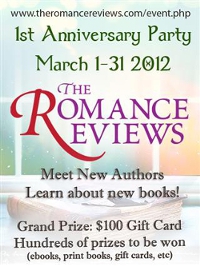
Is Suffering a Virtue?
 We’ve been having an interesting conversation in the comments, and in other places, on my post the other day: Careless Conclusions About Genre Reading.
We’ve been having an interesting conversation in the comments, and in other places, on my post the other day: Careless Conclusions About Genre Reading.
A number of people have mentioned that their culture’s “literary” fiction is depressing. And we’ve been tossing around the idea that literary fiction might be defined that way, as being about suffering. In some ways, this makes sense. The original essay’s author referred to it as “serious reading.” There’s a very strong idea that we gain virtue through suffering.
This concept is pervasive through many religions. In Catholicism, only the spirit matters, so the flesh should be mortified. Physical pleasure should be denied and pain sought out, to liberate the spirit from the flesh. Many oriental philosophies believe that only through pain and suffering do we grow. Pleasure puts us into a dreamy state while pain keeps us alert and aware. This kind of thinking is a part of many martial arts systems, as well. Islam is conducive to the creation of the suicide bomber because the body can be easily sacrificed for the delights of afterlife. Judaism has such a corner on suffering it’s become a stereotype.
Many religious rituals are based in creating pain – fasting, sacrifice, hours of prayer, even self-flagellation.
I think these sorts of ideas underlie the debates over “worthwhile” reading. Romance is all about love and finding happiness; therefore it’s not a weighty genre. Suffering and heartache are resolved with a happy ending, not the sacrifice of the physical self to gain enlightenment. In other kinds of genre literature, the character transformations are rarely about angst of the soul. (Although I think we could make good cases for this in many sci fi & fantasy books.)
I’ve bought into this from time to time in my life. Deliberately denied myself pleasurable things and caused myself various kinds of suffering and pain, to achieve various goals.
And you know what? I’m just not convinced.
I’m blessed with a pretty damn wonderful life. I live in a wealthy country, with access to state of the art health care, culture, food and freedom. I don’t have to worry about my village being raided by Mongols or the plagues warm weather will bring or whether the food supply will last through the winter. My concerns are minor and mostly things I choose to care about, as opposed to being life and death problems.
Which part of this am I not supposed to enjoy?
Sometimes I think just relishing all the wonderful things in life is enlightenment right there. Love, sex, music, food, the scent of flowers and the colors of the migrating birds, time spent talking to interesting people, practicing my art – all of it is so full, rich and rewarding.
It might not be a serious attitude, but then, I never claimed to be a saint.
Never really wanted to be one, in fact.
On that note, I hope you all have a fabulous and FUN weekend!
Birdwoman
I’m over at the Here Be Magic blog today, sharing my creepy true story about Birdwoman. If you never read it, here’s your chance now!
